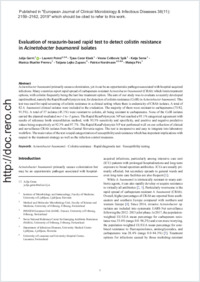Evaluation of resazurin-based rapid test to detect colistin resistance in Acinetobacter baumannii isolates
- Germ, Julija Institute of Microbiology and Immunology, Faculty of Medicine, University of Ljubljana, Slovenia
- Poirel, Laurent Medical and Molecular Microbiology Unit, Faculty of Science and Medicine, University of Fribourg, Switzerland
- Cerar Kisek, Tjasa Institute of Microbiology and Immunology, Faculty of Medicine, University of Ljubljana, Slovenia
- Cvitkovic Spik, Vesna Institute of Microbiology and Immunology, Faculty of Medicine, University of Ljubljana, Slovenia
- Katja Seme Institute of Microbiology and Immunology, Faculty of Medicine, University of Ljubljana, Slovenia
- Mueller Premru, Manica Institute of Microbiology and Immunology, Faculty of Medicine, University of Ljubljana, Slovenia
- Lejko Zupanc, Tatjana Department of Infectious Diseases, University Medical Centre Ljubljana, Ljubljana, Slovenia
- Nordmann, Patrice Medical and Molecular Microbiology Unit, Faculty of Science and Medicine, University of Fribourg, Switzerland
- Pirs, Mateja Institute of Microbiology and Immunology, Faculty of Medicine, University of Ljubljana, Slovenia
-
01.11.2019
Published in:
- European Journal of Clinical Microbiology & Infectious Diseases. - 2019, vol. 38, no. 11, p. 2159–2162
English
Acinetobacter baumannii primarily causes colonization, yet it can be an opportunistic pathogen associated with hospital-acquired infections. Many countries report rapid spread of carbapenem-resistant Acinetobacter baumannii (CRAb) which limits treatment options, with colistin frequently being the last line treatment option. The aim of our study was to evaluate a recently developed rapid method, namely the Rapid ResaPolymyxin test, for detection of colistin resistance (ColR) in Acinetobacter baumannii. This test was used for rapid screening of colistin resistance in a clinical setting where there is endemicity of CRAb isolates. A total of 82 A. baumannii clinical isolates were included in the evaluation. The majority of them were resistant to carbapenems (75/82, 91.5%). A total of 37 isolates (45.1%) were resistant to colistin, all being resistant to carbapenems. None of the ColR isolates carried the plasmid- mediated mcr-1 to -5 genes. The Rapid ResaPolymyxin NP test reached a 95.1% categorical agreement with results of reference broth microdilution method, with 93.3% sensitivity and specificity, and positive and negative predictive values being respectively at 92.3% and 97.7%. The Rapid ResaPolymyxin NP test performed well on our collection of clinical and surveillance CRAb isolates from the Central Slovenia region. The test is inexpensive and easy to integrate into laboratory workflow. The main value of the test is rapid categorization of susceptibility and resistance which has important implications with respect to the treatment strategy as well as the infection control measures.
- Faculty
- Faculté des sciences et de médecine
- Department
- Médecine 3ème année
- Language
-
- English
- Classification
- Biological sciences
- License
-
License undefined
- Identifiers
-
- RERO DOC 327729
- DOI 10.1007/s10096-019-03657-1
- Persistent URL
- https://folia.unifr.ch/unifr/documents/308396
Statistics
Document views: 120
File downloads:
- pdf: 336
